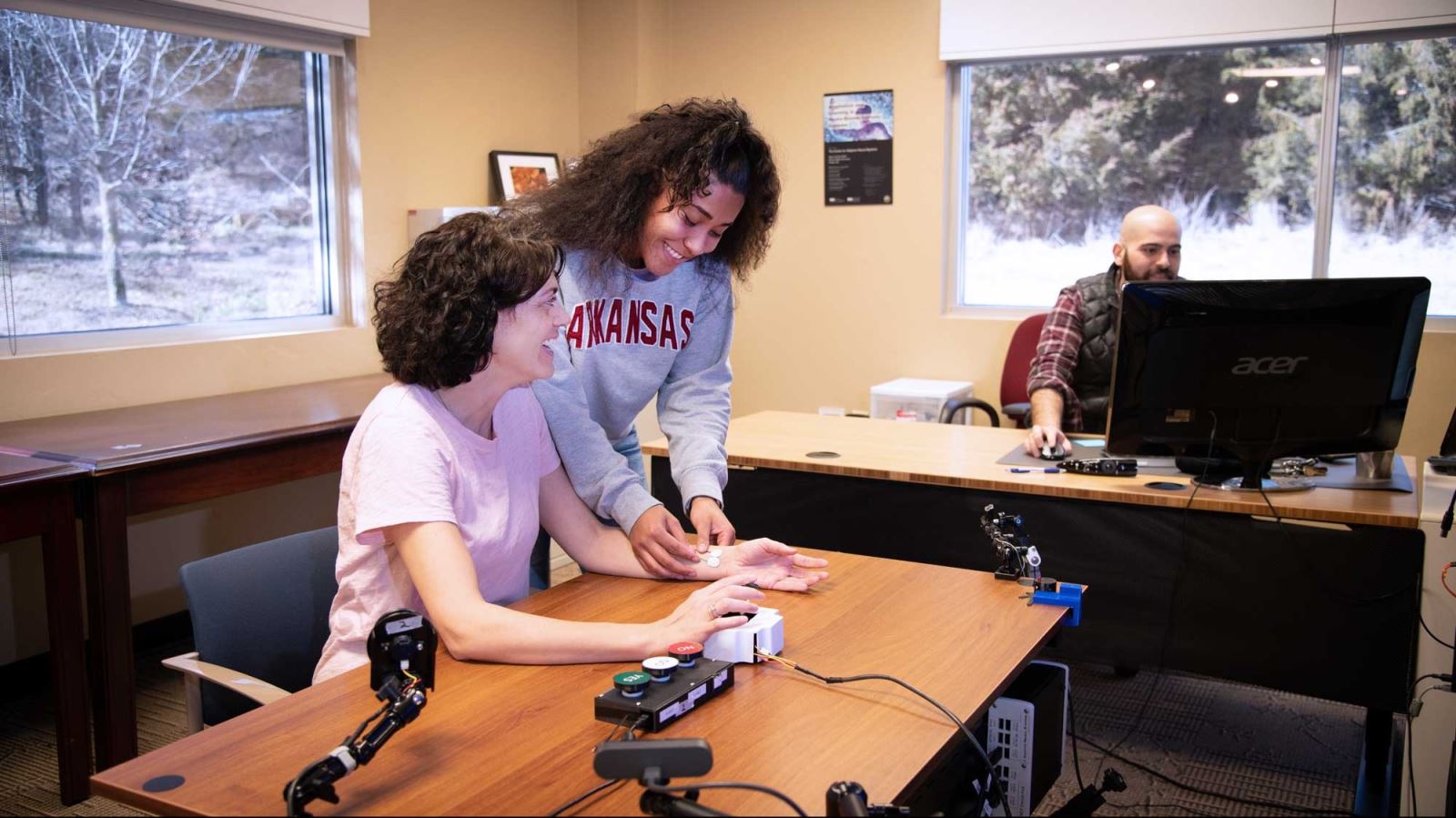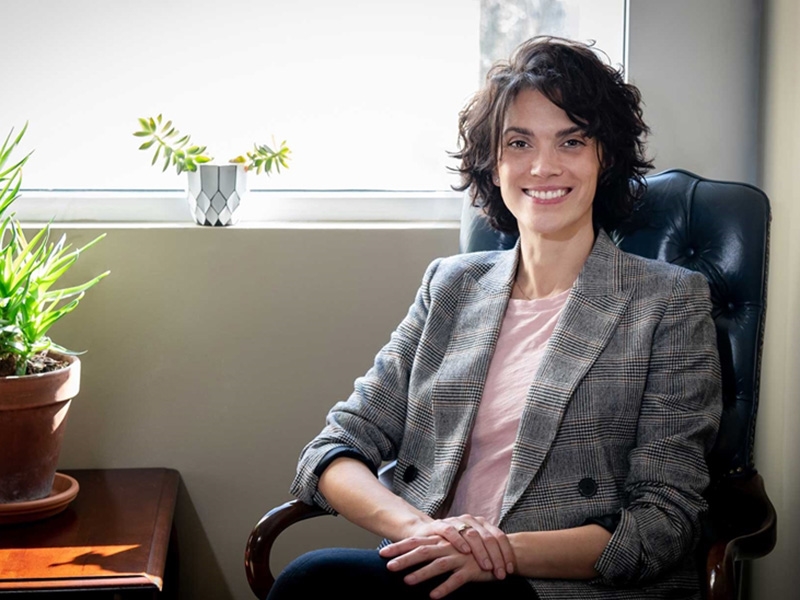When Opportunity Knocks: I³R's First Visiting Professor Reflects on Time at U of A
What does it take to entice someone to leave home for a year? For Dr. Ana Rodriguez-Larrad, the Institute for Integrative and Innovative Research's (I³R) first visiting professor, it was the chance to collaborate with and gain knowledge from engineers working on sensory electrostimulation to improve neurorehabilitation for patients. Rodriguez-Larrad was invited to join I³R and its Adaptive Neural Systems (ANS) Group during the institute's inaugural year.
"It is really exciting to meet people with common scientific interests but different profiles and backgrounds. I enjoy approaching interdisciplinary collaboration challenges that aim to improve the quality of life of the people. I also like to soak in new cultures, environments and lifestyles," she said.
Raised in a town of 20,000 in northern Spain, in the Basque Country, Rodriguez-Larrad recalls that she always was interested in pursuing physical therapy to improve the functionality of individuals with movement disorders.
After receiving her undergraduate degree in physical therapy, Rodriguez-Larrad worked for 16 years as a physical therapist in different settings. Seven years into her career, while working with Olympic gymnasts, Rodriguez-Larrad's encounter with a new patient led to a more specialized interest.
"I started my career working on high-competition athletes' injury rehabilitation, as well as on orthopedic conditions recovery. But at one point, I faced the treatment of a person who had a stroke. That was a turning point in my career." Rodriguez-Larrad continued, "I realized how much the ability to feel the interaction with the world conditioned the movement recovery process. Defining the gait rehabilitation strategy for someone who does not retain the ability to feel if their foot is on the ground, for example, is significantly different and more challenging compared to that for someone who maintains sensory skills. Back then, it was not very common to include sensory training in neurological treatment planning."
Rodriguez-Larrad became increasingly specialized in neurorehabilitation. In the early 2000s, she came across an Italian group led by Professor Carlo Perfetti who was developing a neurocognitive rehabilitation method for recovering from motor disturbances through the activation of cognitive processes. She contacted him to learn more. This later resulted in Rodriguez-Larrad receiving a one-year scholarship to do research with Perfetti's team specializing in the sensorimotor recovery of stroke patients during her time with them.
Eager to gain more knowledge, she returned to school to earn a master's in public health, followed by a PhD.
"During my clinical experience, I felt the need to train myself in research methodology. I was interested in evaluating the effectiveness of the interventions that we were implementing in clinical settings," she said.
 (L to R) Ana Rodriguez-Larrad in the lab with doctoral fellows Aliyah Shell and Tommaso Benigni
(L to R) Ana Rodriguez-Larrad in the lab with doctoral fellows Aliyah Shell and Tommaso Benigni
For the past 10 years, Rodriguez-Larrad has been a faculty member at the University of the Basque Country (UPV/EHU). Describing herself as a lifelong learner, Rodriguez-Larrad enjoys traveling to gain experience and learn about new and emerging therapy techniques. During her time at UPV/EHU, she mainly worked on projects designing interventions aimed to maintain functionality in older adults and evaluating the effects of the implementation of exoskeletons in clinical settings. She also participated in fellowships in the United Kingdom, Canada and now the US.
In 2021, Rodriguez-Larrad came across Dr. Jung and the ANS group while doing research.
"I read some articles by Dr. Ranu Jung and the ANS lab when they were based at Florida International University (FIU). I was amazed by the research they were performing for providing sensation through electrostimulation to people using myoelectric prostheses," she said. "I had the opportunity to apply for a fellowship as a visiting professor, and I didn´t hesitate to contact Dr. Jung. When I got the funding and wrote back to her, she told me that she was moving to the UA to lead I³R. I didn´t think twice: I wanted to be part of that new challenging adventure!" she exclaimed, smiling.
"We were delighted that Dr. Rodriguez-Larrad was interested in spending a year with the ANS team," said Jung, founding executive director and Endowed Chair of I³R. "Her research and background as a physical therapist in neurorehabilitation are a perfect complement to what we are doing. She has been a superb mentor to our biomedical engineering doctoral students. She has also brought to us an international perspective to conduct of team science and clinical care."
While at I³R, Rodriguez-Larrad worked with the ANS Group on several projects. She provided expertise in neurorehabilitation therapy to the group while she learned about new wearable technology developed by the ANS Group for providing sensory electrostimulation.
During her time with the ANS Group on its projects, Rodriguez-Larrad got involved with several projects, including one that is using electrical stimulation to provide sensation to people with limb loss. That project is co-led by Jung and Dr. James Abbas, a biomedical engineering professor and I³R team member. Like all the projects at I³R, this one is addressing a complex problem that requires integrative research and development.
"To provide sensation to someone using a prosthesis, we need people with expertise in various branches of engineering, science and medicine," Abbas said. "Ana has used her clinical and scientific expertise to provide us with valuable insights and viewpoints. This is important for the projects that we are working on now - and it has been great for the students on the team. Their experiences with Ana have now made it second nature for them to be collaborative and integrative in their research. They are - and will be - better researchers because of their work with Ana."
Rodriguez-Larrad and the ANS team have also submitted grant proposals for future I³R collaborative projects that would allow them to sustain their partnership after she returns to Spain.
Turning to more personal matters, Rodriguez-Larrad discussed fun and enriching trips and activities she and her daughter Libe enjoyed while in the US.
"We have had the chance to travel to the west and the east coasts; to hike in the national, state and local parks in Arkansas; to enjoy the traditions of Thanksgiving and the 4th of July; to cheer the Razorbacks; to share recipes in potlucks; to join the book club of the Ozarks Literacy Council; to volunteer; to go to the farmers market, concerts and theatre.," she said. "This is a very culturally vibrant area that offers multiple opportunities to do interesting things. We certainly have had an amazing time this year."
On the subject of sightseeing, she concluded, "We love the USA! And we plan to come back in the future because we believe that there is still a lot to explore!"
On the decision to invite her teenage daughter to join her for a year in the US, Rodriguez-Larrad said, "This is the first extended abroad experience for her. At the time of applying to the fellowship, it was prepared as a family trip. That meant that we were planning the four of us: my husband and my two daughters to come."
Circumstances changed and it was not possible to complete the original plan. "We decided to come, just the two of us. I think that she was very brave to come to a new country, a new school, and for facing the challenge of adapting to a completely new life."
To have a chance at a successful long-term fellowship away from home, support from her family was crucial. Rodriguez-Larrad's spouse, Oskar Gonzalez, saw the advantages offered for her to join the I³R team, even though it meant spending a year apart.
"I understand the importance of continuing education and lifelong learning, especially in a field that continues to change," Gonzalez said. "Having these opportunities to collaborate with leaders of their fields is something Ana couldn't turn down. Of course, it has been challenging, but I am so proud that she had the chance to take full advantage of this opportunity; it was worth the effort as a family to support her," he concluded.
As much as she has enjoyed her time in the States, as her time to return home draws closer, Rodriguez-Larrad is starting to look forward to it.
"We are having very mixed feelings as we are approaching the departure. We are aware that we are going to miss a lot, like all the good friends that we made in this last year, but at the same time, we will be together as a family again," she said. "I´m particularly missing my home, our long chats after dinner with my daughters and husband, the family long meals (we celebrate everything!), sailing in the sea, my friends, the discussions with my colleagues in the university… the little things of daily living," Rodriguez-Larrad said.
As for her professional future, Rodriguez-Larrad shared that upon returning to her home university, she plans to resume her duties teaching and performing research.
"I look forward to incorporating what I've learned to empower my students with knowledge from a collaboration of scientists from both the medical field and the engineering field," she said. "Working together, we strengthened the research to help it move forward to bring increased benefit to those recovering and in need of rehabilitation."
Topics
Contacts
Peg Hart, project advancement specialist
Institute for Integrative and Innovative Research
479-575-6402,
pshart@uark.edu
Andy Albertson, senior director of communications
Research and Economic Development
479-575-6111,
aalbert@uark.edu
Headlines
PetSmart CEO J.K. Symancyk to Speak at Walton College Commencement
J.K. Symancyk is an alumnus of the Sam M. Walton College of Business and serves on the Dean’s Executive Advisory Board.
Faulkner Center, Arkansas PBS Partner to Screen Documentary 'Gospel'
The Faulkner Performing Arts Center will host a screening of Gospel, a documentary exploring the origin of Black spirituality through sermon and song, in partnership with Arkansas PBS at 7:30 p.m. Thursday, May 2.
UAPD Officers Mills and Edwards Honored With New Roles
Veterans of the U of A Police Department, Matt Mills has been promoted to assistant chief, and Crandall Edwards has been promoted to administrative captain.
Community Design Center's Greenway Urbanism Project Wins LIV Hospitality Design Award
"Greenway Urbanism" is one of six urban strategies proposed under the Framework Plan for Cherokee Village, a project that received funding through an Our Town grant from the National Endowment for the Arts.
Spring Bike Drive Refurbishes Old Bikes for New Students
All donated bikes will be given to Pedal It Forward, a local nonprofit that will refurbish your bike and return it to the U of A campus to be gifted to a student in need. Hundreds of students have already benefited.





